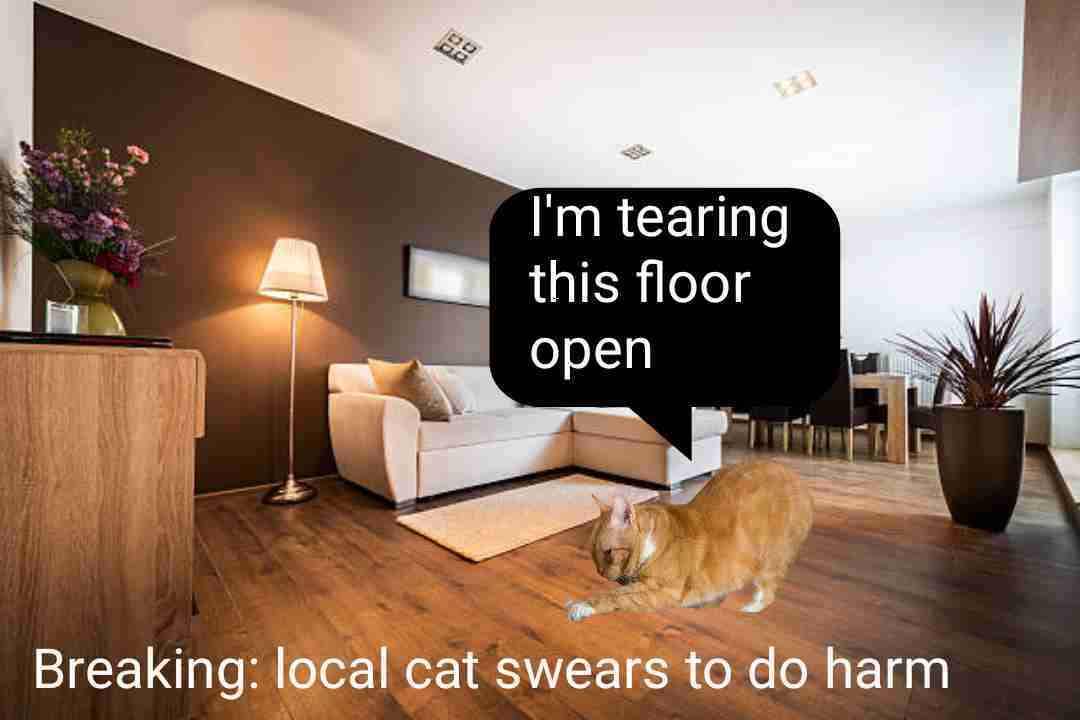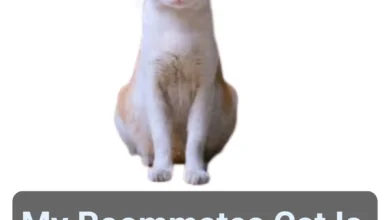Will Cats Scratch Hardwood Floors? + 4 Best Flooring Options for Cats

Will cats scratch hardwood floors? Hardwood flooring is arguably the most conventional building material. It is currently present in both exquisite older homes and many of the best newly constructed homes. Planning on adding a cat to your home? Likely puzzled by the question; will cats scratch hardwood floors?
Cats are cute, and most of them come with beautiful colored coats, like the Maine coon and Siamese mix, but sometimes, they can be so annoying, scratching open furniture, doorways, and pretty much anything. Cats will scratch your furniture, not because they hate you, but depending on their age, training, and instinct; they may be compelled to bury their claws in your hardwood floor. finishes. In cases like this, it is advised not to spank them, but apply redirection tactics.
Table of Contents
- Will Cats Scratch Hardwood Floors?
- Why Cats May Scratch Hardwood Floors
- How Can I Protect My Hardwood Floors From Cat Claws?
- What Is The Best Flooring For A House With Cats?
- Final Thoughts
Will Cats Scratch Hardwood Floors?
Unfortunately, cats tend to scratch more than just furniture and carpeting, hardwood floors are also potential victims of a cat’s claws. But, can a cat scratch hardwood floors? The answer is yes, cats can and do scratch hardwood floors.
The truth is that cats need to scratch, it’s a natural instinct, and they will scratch anything they can get their claws into. Hardwood floors are no exception. Whether you have hardwood flooring in your living room, dining room, or bedroom, if your cat has access to those areas, it’s likely that your floors will eventually end up with scratches. But don’t despair! There are ways to protect your hardwood floors from your cat’s scratching and we have detailed them below.
Why Cats May Scratch Hardwood Floors
Cats are known for their playful and curious nature, and they often express these traits through scratching. Unfortunately, this can be a problem for cat owners when their cats scratch their hardwood floors. Cats may scratch hardwood floors for a variety of reasons and understanding why cats scratch can help owners take the necessary steps to protect their floors.
The first and most common reason cats scratch hardwood floors is to mark their territory. Cats have scent glands located in their paws and when they scratch surfaces, they are leaving behind their scent. This helps cats to feel safe and secure in their environment and keeps other cats away. Cats may also scratch hardwood floors as a way to sharpen their claws and relieve stress.
Another reason why cats scratch hardwood floors is because they enjoy the texture and feel of the wood. Cats are drawn to surfaces that have a certain texture, and hardwood floors often have a smooth and inviting texture that cats love.
Also, cats may scratch hardwood floors as a way to “play”. Cats often use objects, including furniture and floors, as a way to express their natural hunting instincts. While cats may use scratching as a form of play, this behavior can quickly become destructive and should be discouraged.
By providing your cat with alternative scratching surfaces and discouraging the behavior in other ways, you can help protect your hardwood floors and keep your cat happy and healthy.
How Can I Protect My Hardwood Floors From Cat Claws?
Cats are adorable and incredibly fun to have around, but their sharp claws can be a real hazard for hardwood floors. Scratches, dents, and gouges can quickly accumulate on hardwood floors, leaving them looking dull and worn. Fortunately, there are numerous ways to protect your hardwood floors from cat claws and keep them looking great.
First of all, it is important to keep your cat’s nails trimmed. This will help prevent them from doing as much damage to your floors. You can also purchase nail caps for your pet, which are small plastic caps that fit over their claws and help reduce scratching.
Secondly, consider using a scratching post or cat tree in your home. This will give your cat a place to scratch its claws without damaging your flooring. You can also buy scratching mats that your cat can use to sharpen their claws.
Thirdly, look into purchasing stick-on plastic guards for your furniture legs. These guards will help protect your furniture from being scratched by your cat’s claws.
It is crucial to keep up with regular maintenance on your hardwood floors. Vacuum and mop regularly, using a cleaning solution specifically made for hardwood floors. This will help keep your floors looking their best and reduce the visibility of damage done by your cat’s claws.
By taking the steps listed above, you can help protect your hardwood floors from your cat’s claws and keep them looking beautiful. With a little extra care, you can make sure your pet’s sharp claws don’t cause any lasting damage to your floors.
What Is The Best Flooring For A House With Cats?
When it comes to choosing the best flooring for a house with cats, there are many factors to consider. From durability to cost, taking the time to research the pros and cons of different flooring options will help you make the best choice for your home.
The most common flooring options for a house with cats are hardwood, laminate, luxury vinyl plank (LVP), and tile. All of these flooring types have their unique advantages and disadvantages when it comes to cats.
Hardwood Flooring
Hardwood flooring is one of the most popular flooring options for a house with cats. Hardwood is aesthetically pleasing and can add a warm and classic feel to any room in your home. However, hardwood flooring can scratch easily, so if you have active cats that like to play and jump around, it may not be the best flooring choice. Additionally, hardwood is the most expensive option and can be difficult to install.
Laminate Flooring
Laminate flooring is a cost-effective option that is more scratch-resistant than hardwood. Laminate is designed to look like hardwood, but it is made from synthetic materials that are cheaper and easier to install. Laminate flooring is also water-resistant, which is great for homes with pets since accidents can happen. However, laminate flooring is not as durable as hardwood, so it can become scratched or damaged over time.
Luxury Vinyl Plank (LVP) Flooring
Luxury Vinyl Plank (LVP) flooring is a great option for a house with cats. LVP is much more water-resistant than laminate and is also more durable, so it can stand up to scratches and heavy foot traffic. LVP is also relatively easy to install and is a budget-friendly option for pet owners. The main downside to LVP flooring is that it can be slippery, so it may not be the best option for homes with cats that like to run and play.
Tile Flooring
Tile flooring is a great option for a house with cats. Tile is incredibly durable and can stand up to scratches and heavy foot traffic. Additionally, tile is also water-resistant, so it is a great choice for pet owners. The main downside to tile flooring is that it can be cold and hard, which may not be comfortable for cats. Additionally, tile flooring can be expensive and difficult to install.
The best flooring for a house with cats depends on many factors, such as cost, durability, and comfort for your cats. All of the flooring options mentioned above have their unique advantages and disadvantages, so take the time to research the pros and cons to each option before making a decision.
Final Thoughts
When your feline friend is young, they are termed “evil kittens“, because of their curiosity level and the urge to explore. This may lead them to scratch your hardwood floor in a form of play; they will also want to contribute to the effectiveness of their hunting skills by trying to sharpen their claws on your furniture or floors.
With the provision of essential tools like cat trees and scratching posts, you will be able to train kittens not to scratch your house finishes. Senior cats are probably trained by you and may not engage in such a destructive act, except if it’s sickness or emotionally triggered.




